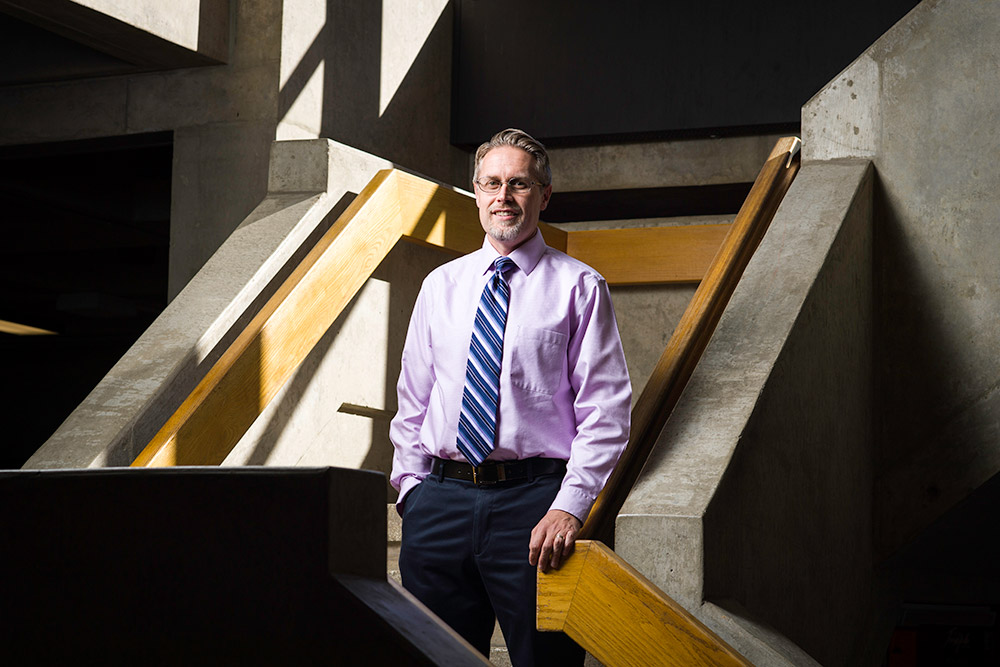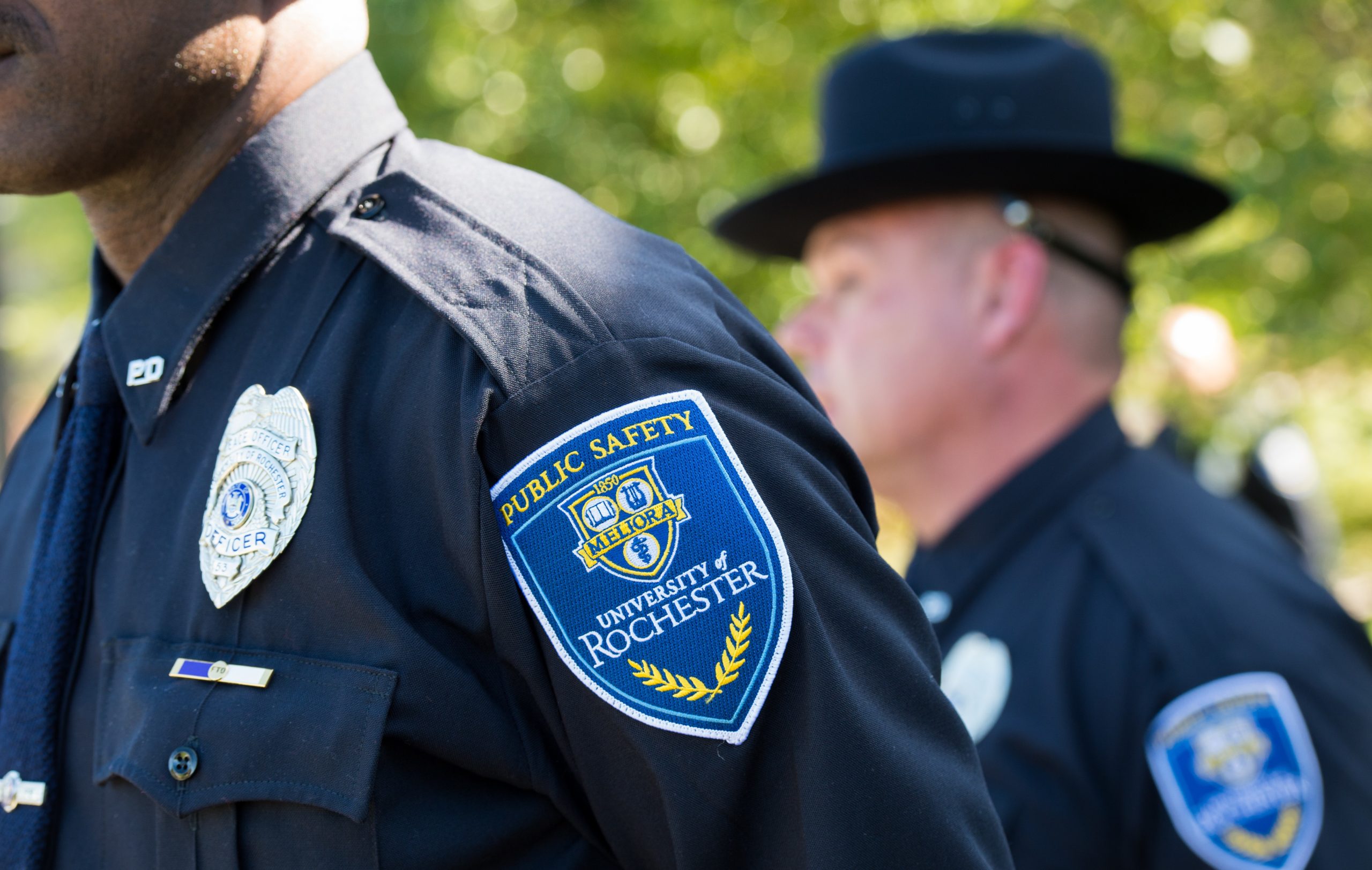Bradley Nilsson, associate professor of chemistry, is among one of the 2016 recipients of the Goergen Awards for Excellence in Undergraduate Teaching.
I was originally a biology major and planned to go to med school. If someone told me my freshman year that I’d become a chemistry professor, I’d have thought they were crazy.
I had to take chemistry classes at BYU, and after taking two my freshmen year, I didn’t find them very enjoyable. It was very dry. But I was fortunate to find an organic chemist who became my mentor and changed my life. I got into his lab, and organic chemistry came alive to me. I realized I liked going into the lab and learning things where there was no right answer. I thought, “This is something I can see myself doing for the rest of my life.”
When you’re teaching 30 or 40 students, you can quickly see if the class is with you or not. With 300-plus students, you can’t even see the last two-thirds of the group so it’s hard to know if they’re following you or not.
I wanted to make chemistry engaging. That’s what hooked me, hours outside of class going through problem sets. I decided to give my class online problem sets before I lectured on the topic. The first few years, students hated it. They’d say, “You haven’t even talked about it in class yet, so why are you making us do these problem sets?” And I’d say, “That’s exactly why I’m making you do them.” They use the textbook to answer the questions, then it’s reinforced in class. I’ve seen a 10 percent improvement in grades since I started doing that.
Teaching is a partnership between student and instructor at the college level.
There’s a heavier burden of learning on the student. The professors provide a framework. It’s my responsibility to make the subject material engaging, to show or say something that they’ll think is cool and suck them in and then be available to walk through any issues we have.
I wasn’t a model student. I wasn’t a 4.0 GPA. I’ve experienced poor grades. And that has helped me as a teacher.
Sometimes as a professor, you forget that you didn’t always know this stuff. It’s easy to forget what it was like when you didn’t know it. It’s important to have compassion. That doesn’t meet you don’t teach with rigor. Students who have taken my class will agree it’s not an easy ‘A.’ But for those who struggle, I tell them, “Your value as a person isn’t tied to how you do in organic chemistry. You can get a ‘D’ and still be a great person.”
One thing that was started years ago in our department and is now prevalent across campus are workshop sessions, where students meet with a smaller group of peers. I find them essential.
It’s usually less than 10 students, and you meet with someone who has taken the course in a previous year. Their job isn’t to lead or answer but to act as a discussion leader. These workshops help those students who sit in the back and don’t ask questions. They’re more likely to speak up in a group of 10 than 300.
My goal is to help students recognize they’re capable of learning and mastering the material if they’re willing to put in the effort. And maybe it’s not the first time.
I’ve had several students re-take a class. One student really performed poorly and was almost embarrassed to talk about taking it again. I said “Look, just because you got that grade doesn’t mean that’s what you’re capable of. It just means the material didn’t click with you.” She took the class again, and this time she did really well.
Criticism is never fun, especially when it comes in the form of evaluations from students, but it makes you a better teacher.
When you’re teaching a class with 300-plus students, 10 or 15 percent are going to hate everything you do. No one likes to be criticized, and if you’re not careful, that criticism can put a bitter twist on life. The key is learning to take that criticism and apply it to change, find what’s the truth in the criticism and turn it into a productive outcome.
Mentorship in an undergraduate lab is one of the most meaningful parts of my job. My first one just finished his residency and works with the Navy, specializing in psychiatry.
Mentoring undergraduates is really a synergistic experience. There’s great value in the one-to-one mentorship in terms of helping the student really begin to think critically as a scientist and a problem solver. They get a chance to work on a scientific project in which the “big picture” is usually defined for them at the beginning by the advisor. Their independent thinking comes in working on solving the inevitable day-to-day problems that come with any research project. In time, as students become more comfortable with their work, they begin to have ideas that address the “big picture” as well. This real-world problem solving is invaluable.
I’m not all about chemistry. I have four kids of my own, from a sophomore in college to a fourth-grader, and they really are my biggest hobby.
They demand a lot of your time, but I love it. They’re great. I also love to read, and I love all sorts of music. When I was in high school, my dream was to play guitar in a rock band. My favorite band growing up was Van Halen, and I’ve seen them three times. Last summer, I took my oldest daughter to see them. The rest of the band was pretty good, but it was pretty pathetic to see 60-year-old David Lee Roth trying to do splits off a drum riser.




